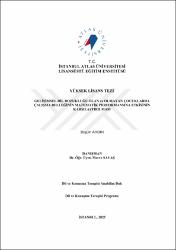| dc.contributor.author | Aydın, Begüm | |
| dc.date.accessioned | 2025-10-15T07:55:03Z | |
| dc.date.available | 2025-10-15T07:55:03Z | |
| dc.date.issued | 2025 | en_US |
| dc.date.submitted | 2025 | |
| dc.identifier.citation | Aydın, B. (2025). Gelişimsel Dil Bozukluğu Olan ve Olmayan Çocuklarda Çalışma Belleğinin
Matematik Performansına Etkisinin Karşılaştırılması. Yüksek Lisans Tezi, İstanbul Atlas
Üniversitesi Lisansüstü Eğitim Enstitüsü, Anabilim Dalı, İstanbul. | en_US |
| dc.identifier.uri | https://hdl.handle.net/20.500.12900/863 | |
| dc.description.abstract | Bu araştırmada amaç, Gelişimsel Dil Bozukluğu (GDB) olan ve Tipik Gelişim Gösteren (TGG) çocukların çalışma belleği performanslarının rutin olmayan sözel problemlerdeki matematiksel performanslarına etkisini incelemektir. Araştırmaya Türkçe Okul Çağı Dil Gelişimi Testi (TODİL)'e göre, GDB olduğu saptanan (n=26) ve TGG (n=26) 6- 8.11 ay yaş aralığındaki toplam 52 çocuk dahil edilmiştir. Katılımcılara WISC-R Zeka Testi; Çalışma Belleği Ölçeği (ÇBÖ) ve rutin olmayan matematiksel problemler uygulanmıştır. GDB olan çocukların ÇB kapasiteleri (sözel, görsel ve toplam) (p<0.05) ve rutin olmayan sözel problemlerdeki matematiksel performansları (p<0.05) TGG akranlarına kıyasla istatistiksel olarak anlamlı ölçüde düşük bulunmuştur. Regresyon analizinde, ÇB alt testleri (r=0.527) ve TODİL-Organize Etme bileşke puanının (r=0.419), matematiksel performans ile ilişkili olduğu görülmektedir. 6 yaş- 8 yaş 11 ay arası çocuklarda GDB; rutin olmayan sözel problemlerdeki matematiksel performansı ve ÇB'yi olumsuz etkilemektedir. TODİL-Organize Etme bileşke puanı ve ÇB becerileri, katılımcıların rutin olmayan sözel problemlerdeki matematiksel performansları üzerinde belirleyici bir role sahiptir. | en_US |
| dc.description.abstract | The aim of this study is to investigate the effect of working memory performance on mathematical performance in non-routine verbal problems in children with Developmental Language Disorder (DLD) and Typically Developing (TD) children. The study included a total of 52 children aged between 6 and 8 years and 11 months, identified as having DLD (n=26) and as TD (n=26) according to the Test of Language Development-Primary: Fourth Edition (TOLD-P4). Participants were assessed using the WISC-R Intelligence Test, Working Memory Scale (WMS) and non-routine mathematical problems were administered. The working memory capacities (verbal, visual, and total) (p<0.05) and mathematical performance in nonroutine verbal problems (p<0.05) of children with DLD were found to be statistically significantly lower compared to their TD peers. Regression analysis showed that the working memory sub-tests (r=0.527) and the TOLD-P4 Organizing score (r=0.419) were related to mathematical performance. DLD negatively affects mathematical performance and working memory in children aged 6 years to 8 years and 11 months. The TOLD-P4 Organizing score and working memory skills play a decisive role in the participants mathematical performance in non-routine verbal problems | en_US |
| dc.language.iso | tur | en_US |
| dc.publisher | İstanbul Atlas Üniversitesi, Lisansüstü Eğitim Enstitüsü | en_US |
| dc.rights | info:eu-repo/semantics/openAccess | en_US |
| dc.subject | Çalışma belleği | en_US |
| dc.subject | Gelişimsel Dil Bozukluğu | en_US |
| dc.subject | Matematiksel Performans | en_US |
| dc.title | Gelişimsel dil bozukluğu olan ve olmayan çocuklarda çalışma belleğinin matematik performansına etkisinin karşılaştırılması | en_US |
| dc.type | masterThesis | en_US |
| dc.department | İstanbul Atlas Üniversitesi, Lisansüstü Eğitim Enstitüsü, Dil ve Konuşma Terapisi Ana Bilim Dalı | en_US |
| dc.relation.publicationcategory | Tez | en_US |

















